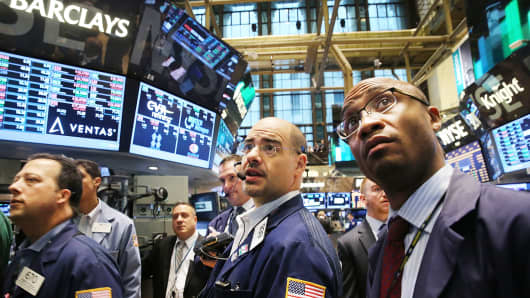Global stock markets may be in the middle of a correction as this year's bull run slowly vanishes, but Peter Oppenheimer, Goldman Sachs' European equities strategist told CNBC that equities will continue to rally after a "processing" period comes to an end.
"I think that equities are still the only asset class that offers a reasonable enough valuation and fundamentals to generate a decent return over the medium term," he told CNBC Tuesday.
Oppenheimer told CNBC that the sell-off in equities alongside bonds had come as a surprise, with Goldman Sachs reiterating several buy recommendations this year for equities. Oppenheimer himself penned a report titled "The Long Good Buy; The Case for Equities" last year describing stocks as a once-in-a-lifetime opportunity.
(Read More: Goldman Sachs: Keep Calm and Carry On Buying)
"We didn't anticipate this particular transition that we are seeing at the moment. What we did believe is that at some point bond yields would rise. We felt that the initial stages of bond yields rising would be actually be accompanied by rising equity prices because both would reflect an increase in growth expectation." he said, adding that investors are currently deciding which assets have become overvalued and this move lower will be temporary.
A sharp rise in bond yields has been accompanied by a downward turn for stock markets since last week after the U.S. Federal Reserve indicated that it could scale back its asset purchasing program worth $85 billion a month. The Fed also trimmed its growth forecasts to between 2.3-2.6 percent for 2013, whilst Goldman Sachs predicts growth will be closer to 2.1 percent.
"The Fed's own forecast for growth this year is stronger than our own by about half a percent. And to justify bringing Fed tapering forward, growth has really got to be stronger and that ultimately will be supportive for risky assets."
(Read More: Short Term, Markets Are Oversold: Marc Faber)
"We believe the next phase for equities will really be driven by fundamental profit growth as opposed to valuation expansion."
Stock markets around the globe have been reeling since the Fed Chairman unveiled a rough roadmap for the moderation of the quantitative easing (QE) program. Fears of a credit squeeze in China have also exacerbated the drop with the pan-European FTSEurofirst 300 Index closing Monday's session at its lowest level since November 29.
The U.K. FTSE, France's CAC and Germany's DAX have all wiped out strong gains for the year and have entered, or are close to entering, official "correction territory" with falls of over 10 percent since their tops. Japan's Nikkei index has plummeted 17 percent since its peak for the year, being 46 percent higher year-to-date in mid-May. In the U.S., the Dow Jones and the S&P 500 have both sliced 5 percent off market tops.
European indexes showing a modest rebound on Tuesday however, indicating some investors may be keen to get back into the market. Vincent Cassot, a derivatives strategist at Societe Generale, believes investors should use leveraged financial instruments, rather than buying stocks outright.
"With mounting threats of QE exit and a China slowdown, the outstanding rally in equity markets might come to an end," Vincent Cassot, a derivatives strategist at Societe Generale said in a research note on Monday.
(Read More: Meltdown in China Stocks About to Get Worse?)





